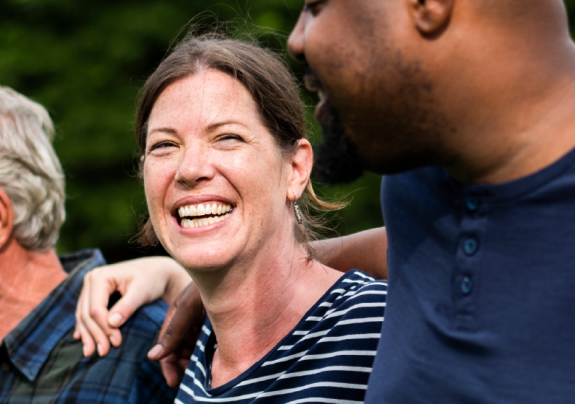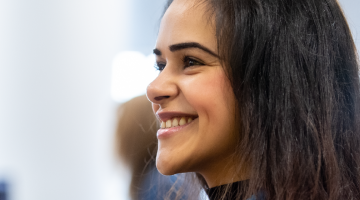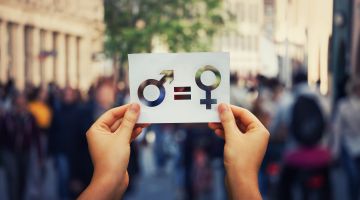The Ethnicity Affinity Group has been brought together to help create a workplace where ethnicity and differences are a positive thing. Primarily, the Group do this with two-way communication on all topics with all colleagues in an open, honest and positive way
The group’s purpose is to create and embed a workplace where ethnic diversity is celebrated, encouraged and championed to motivate colleagues. So the team have identified four key focus areas where they feel they can make the most impact.
Focus areas
Raising Awareness:
- Create and sustain an internal community that operates as a positive space to share views with affiliated colleagues.
- Educate colleagues – including senior leadership – through events communications and other channels.
Culture:
- Awareness, amplification and celebration of ethnic touch points across the Banking Group.
-
Provide direction to the business on any ethnicity related developments and campaigns.
-
Provide a safe space for colleagues to be connected and supported, and to process and discuss experiences.
Career Progress:
- Support the recruitment, retention and development of more ethnically diverse candidates and colleagues across the Banking Group.
- Help Vanquis Banking Group to recruit underrepresented individuals and develop a talent pipeline.
Social impact:
- Promote and support the Banking Group in broader community engagement related to ethnicity.
Ethnicity Affinity Group Leads
- Nick Jhutti
- Rupa Green
Black History Month 2023
An occasion that recognises and celebrates the invaluable contributions of black people to society and serves as an opportunity to inspire and empower future generations.
This month we are celebrating our brilliant talent from our multicultural communities by featuring a variety of colleagues from different backgrounds and job roles across the Group, sharing what equality means to them.
I am a second generation Jamaican and love so many parts of my Carribean heritage. Most significantly the strong family unit that I come from, including my extended family. My 97 year old grandfather came to the UK 70+ years ago, his work ethic and drive is echoed by so many of the Carribean people that came here and really is something to be proud of.
Read Tashema's full profile here
Tashema Jackson, Commercial Manager
Working for the Ministry of Ethnic Communities in New Zealand, it was the first time I was in engagements where most people represented a minority group - I was surprised that this made a positive difference to my confidence. It was also inspiring to hear everyone’s visions for an inclusive society.
Read Cassandra's full profile here
Cassandra Ong, Lead Service Designer, Cards
Celebrating cultural diversity is important to me because it makes me feel like a valued part of a community. It’s also a chance for me to support, learn from and connect with people from different backgrounds, whether it be my own or another.
Read Afsana's full profile here
Afsana Sayeed, Content Associate, Cards
I take pride in my Jamaican heritage. It’s truly remarkable that such a small country has left such an indelible mark on the world stage. Producing not only world-class athletes, but also brilliant minds who have contributed significantly to various fields.
Read Imogen's full profile here
Imogen-Campbell Heanue, UX Designer
I always think about the three main female characters from the Hidden Figures movie. I admire their perseverence and dedication, portrayed by these ladies working in NASA throughout the 1960's, during which time racial and gender segregation was in place in the USA.
Read Eric's full profile here
Eric Chia, Financial Crime Risk Assistant Manager
Campaigns like this are a great way of showing colleagues how inclusive and diverse we are as a business. I think it’s important to really get to know our colleagues. After all, we spend just as much time at work as we do with our families.
Read Xiaopei's full profile here
Xiaopei Lockwood, Group Senior Lawyer
In my view, Black History Month is to remember the contributions and achievements of the black community. This year also marks the 75th anniversary of the Windrush Day which is equally important. Black History Month should be taught at a very young age in schools so people can learn the importance of equality and respect.
Read Maxeen's full profile here
Maxeen Scott, Corporate Receptionist
I’m proud of the innate resilience in our Pakistani heritage. Despite numerous challenges, our people persist. As a Muslim woman and a mother of a daughter, I see women, including myself, breaking societal barriers. This demonstrates our resilience and capacity to evolve and thrive.
Read Nadia's full profile here
Nadia Zaheer, Data Science Manager
We should celebrate diversity more! For example, having an Ethnic Day where colleagues bring their local food and discuss their culture. This would also help others to understand the different ways of working in other countries.
Read Sheilly's full profile here
Sheilly Khonda, UX Researcher
I regularly explored alternative school reading outside of the curriculum, reading autobiographies on Nelson Mandela, Malcolm X and Ghandi. Through this and my own lived experiences, I learned the value of using your voice, persevering through adveristy, and above all, never giving up.
Read David's full profile here
David G Jones, Senior UX Designer
Celebrating cultural diversity is important as I find this educates people. You get to learn about different cultures, the meaning behind each celebration, and you’ll understand why people do things in a certain way and the reasoning behind it.
Read Shanaz's full profile here
Shanaz Khan, Customer Coordinator
Recent Case Studies
International Day for the Elimination of Racial Discrimination (IDERD) is observed annually on 21 March, serving as a moment to reflect on inherent structures of power and to redouble efforts to eradicate all forms of racial discrimination
Across the Group, we celebrate diversity and promote inclusivity every day.
On this day, the Be Yourself Ethnicity Affinity Group brought awareness to this significant historical event, featuring remarks from our South African colleagues, and explaining to colleagues how they could show their support to #FightRacism.
What is IDERD and why is it important?
On 21 March 1960, 69 people were killed by police at a peaceful demonstration against apartheid “pass laws” in Sharpeville, South Africa. These laws, instituted under British rule and modelled after similar laws instituted against Indigenous people in Canada, served to limit the movement of Black people, people of colour, and Indigenous people in Africa. While such overt racial discrimination may feel like ancient history, recent world events remind us that we still have a long way to go to challenge racial discrimination.
In South Africa, the democratic government declared 21st March Human Rights Day to commemorate and honour those who fought for the liberation and the rights enjoyed today. It is also a public holiday to remind South Africans about the sacrifices that accompanied the struggle for the attainment of democracy in South Africa. The commemoration provides the country with an opportunity to reflect on progress made in the promotion and protection of human rights.
The South African Constitution is hailed as one of the most progressive in the world. The Constitution is the ultimate protector of Human Rights, which were previously denied to the majority of people under Apartheid. South Africans commemorate Human Rights Day to reinforce the commitment to the Bill of Rights as enshrined in the Constitution.
These rights include:
1. Equality – everyone is equal before the law and has the right to equal protection and benefit of the law.
2. Human dignity – everyone has inherent dignity and have their dignity respected and protected.
3. Freedom of movement and residence – everyone has a right to freedom of movement and to reside anywhere in the country.
4. Language and culture – everyone has the right to use the language and to participate in the cultural life of their choice.
5. Life - everyone has the right to live.
To show some of the positive changes and negative encounters South Africans still face, our colleagues in South Africa share their experiences:
"People have evolved & are open to engage with any race when it comes to work or even public areas."
"A customer asked to speak to someone from the UK, Cheryl promises to assist & handle the matter for the customer. Customer started using foul language whilst also saying we need to go back to our country."
"[People] of colour have more opportunities and are free to go anywhere they want compared in Apartheid when they were restricted."
"Here in South Africa, we still have a population with high unemployed black and coloured communities."
"[Racism] isn’t completely gone. We have certainly made positive strides towards a better future where people of different races can work together in successful companies."
"A Black petrol attendant was racially discriminated against due to the fact that it was perceived that he only assisted fellow Black people. This obviously was not the case."
"Female colleague was approached a “white” lady to ask a question, [but was mistaken for asking] for money, which made her feel discriminated against."
Showing support
For colleagues in South Africa who are celebrating Human Rights Month throughout March, it’s a reminder that everyone has the responsibility to uphold a culture of human rights and to shape the country’s future, whether it’s using their influence within the workplace or community, at school, or with our partners and children. Outside of South Africa, we can support by learning from this story, spreading the word and find ways to get involved in making positive change.
The Ethnicity Group asked colleagues to show their solidarity by updating their Microsoft Teams background to help raise awareness.
For the day of Cultural Diversity for Dialogue and Development, the Group shared an article which inspired a lot of positive conversation and sharing, internally:
Cultural diversity is the existence of different cultural or ethnic groups within society. Learning about other cultures can help to broaden our understanding of others in our communities. It also helps eliminate biases about those who are different due to religion, ethnicity, language, nationality, and other characteristics.
According to the UN, three quarters of the world’s major conflicts are due to culture clashes. Therefore, bridging the gap between cultures is urgent and necessary for peace, stability, and development.
First declared by the UN in 2002, World Day for Cultural Diversity for Dialogue and Development is commemorated on 21st May, providing an opportunity to deepen our understanding of the values of cultural diversity, recognising culture’s contribution to sustainable development – one that the UN refers to as a ‘driving force of development, not only with respect to economic growth, but also as a means of leading a more fulfilling intellectual, emotional, moral and spiritual life’. You can learn more about this day and about cultural diversity here.
Fostering multiculturalism is not only positive in terms of contributing to global peace, stability, and development - it can also benefit organisations such as ours. Studies have shown that multicultural teams are more creative than homogenous teams, especially those with more diverse attitudes and values towards culture.
The senior leadership team within PFG particularly acknowledge the positives of sharing unique perspectives and experiences, not just for innovating at work but for team members to become more well-rounded, as exhibited by the huge strides being made by the PFG Be Yourself diversity and inclusion community.
The Ethnicity Affinity Group exists to create a workplace where ethnic and cultural differences are celebrated. To bring this to life, members of the Ethnicity Affinity Group encouraged all of us to learn something about another culture and to think about how cultural diversity brings us together by sharing some of their favourite culturally specific dishes. They invited colleagues you to share theirs, by visiting the Ethnicity Affinity Group Social Intranet pages to share their favourite cultural dish and why.
Sol’s favourite dish: Akara – a delicious main course
Akara (savoury Nigerian pancakes). If I was stranded on a desert island but had one limitless food supply/option it'd be this. Just the right mix of spice and savoury, super-efficient as can be served / eaten hot or cold too. So much cultural cohesion comes from shared experiences, like many, I have fond memories of what the communal serving of this food evokes. I know how to make it too, so at some stage, we can have a real-life world food day. My Mum's are better though, so maybe we'll enlist her!
Jenn’s favourite dish: Tang Yuan - A dessert to finish
Tang Yuan can be described as sweet dumplings, and they’re very easy to make. The outer ‘wrapper’ is made of glutinous rice flour so the texture is sticky soft, and the filling can be a simple sweet black sesame paste, red bean, or peanut – all of which are popular choices. Then, it’s boiled and steeped in a lightly sweet soup made of ginger and brown sugar and eaten together. The filling and combinations will vary depending on the region of China you’re from, or what your family raised you on.




